Optimizing Men's Health: 10 Essential Tips for a Strong and Vibrant Life

Key Takeaways
Did you know that compared to women, men face unique health challenges and are at a higher risk for certain health conditions? If you’re a man working to navigate your daily responsibilities, personal goals, and societal expectations, it’s equally important to make sure you prioritize your health and well-being.
When it comes to metabolic health, research shows that men are more likely to develop cardiovascular disease earlier than women, and may also have a higher risk of developing type 2 diabetes. They’re also statistically less likely to seek mental health treatment than women.
So as a man, how can you make sure you’re making the right lifestyle choices for better health? Read on as we discuss ten men’s health tips that can help you thrive physically, mentally, and emotionally and lead a strong and vibrant life.
What Should Men Do For Better Health?
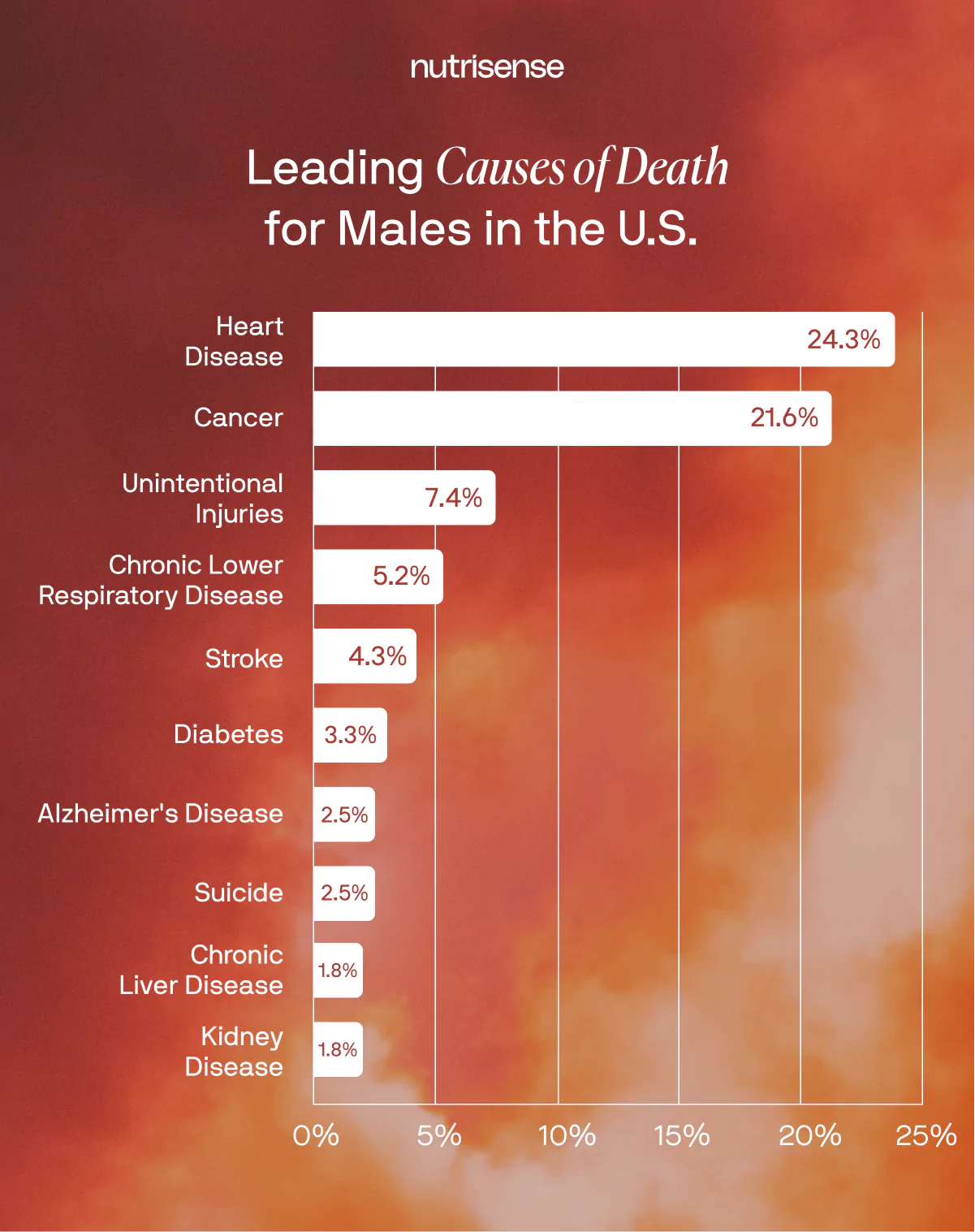
Before we take you through a list of health tips for men, let’s talk about the leading causes of death affecting U.S. males. According to the CDC, the top conditions affecting men's health include:
- Heart Disease (24.3%)
- Cancer (21.6%)
- Unintentional Injuries (7.4%)
- Chronic Lower Respiratory Disease (5.2%)
- Stroke (4.3%)
- Diabetes (3.3%)
- Alzheimer's Disease (2.5%)
- Suicide (2.5%)
- Chronic Liver Disease (1.8%)
- Kidney Disease (1.8%)
While these statistics may be a little scary, the good news is that there are ways to reduce the risk or even prevent certain conditions by introducing healthy lifestyle changes earlier on in life. Let’s take a look at some healthy habits that can help benefit your heart health and potentially lower the risk of some of these other conditions or events.
1) Eat a Balanced Diet
As is the case for anyone, following a healthy diet is important for providing the necessary nutrients and energy to support bodily functions, maintain a healthy weight, and prevent conditions related to men's health. So what really is a balanced diet?
This can consist of a variety of foods from different food categories, including fruits, vegetables, whole grains, lean proteins, and healthy fats. Deriving these foods from whole foods more so than ultra processed foods is a great start. A diet rich in whole foods also naturally provides essential vitamins, minerals, antioxidants, and fiber.
As we saw above, men are more likely to develop heart disease than women. Dietary patterns such as the Mediterranean diet have proven effective in reducing risk for developing chronic conditions like cardiovascular disease and diabetes.
And a healthy diet isn’t just good for your heart! Eating well and nourishing your body with the foods it needs can also promote weight management, which is crucial for overall health and wellness.
2) Get Appropriate Amounts of Exercise
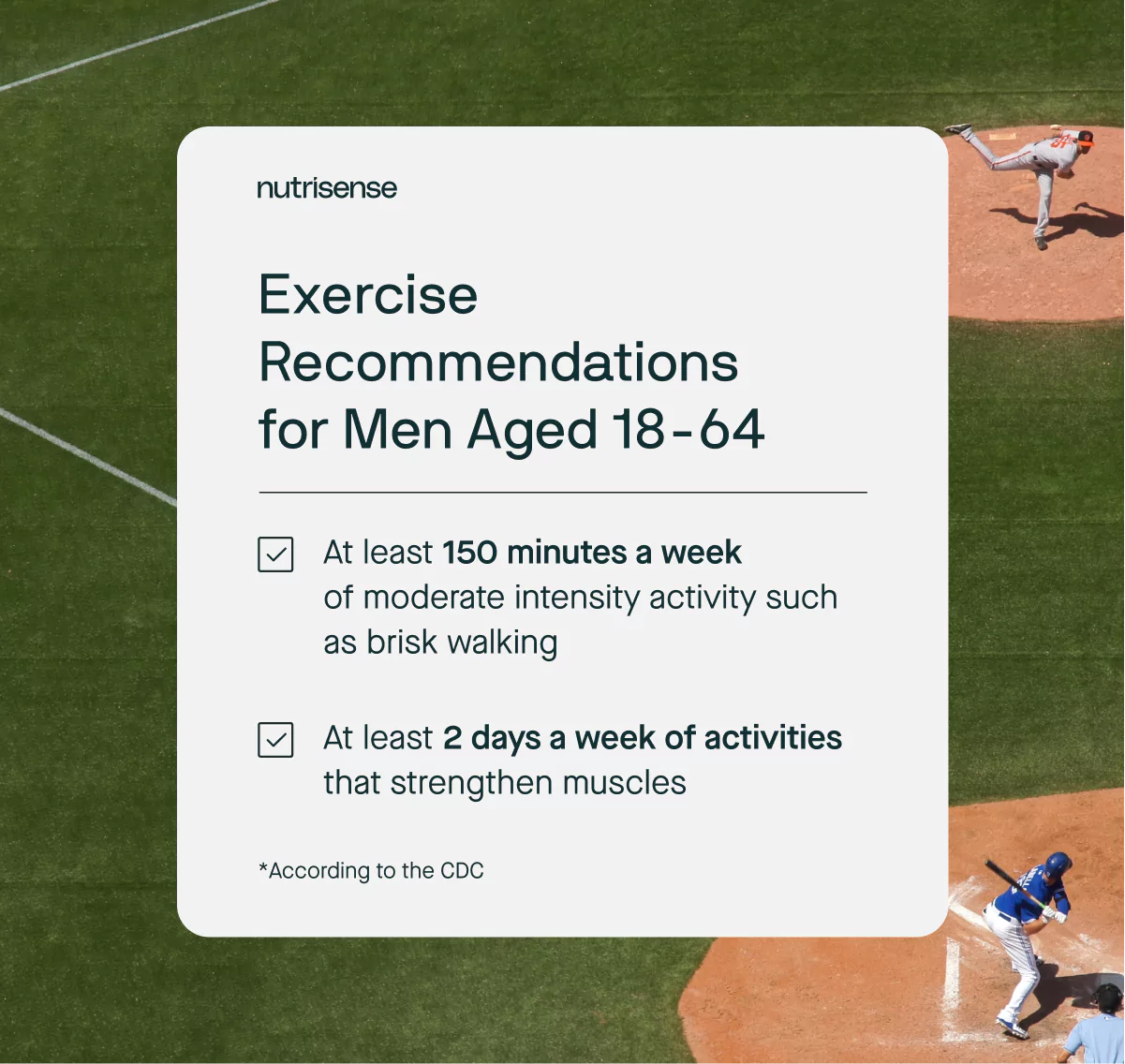
Regular physical activity is another important part of the puzzle when it comes to men's health. Regular exercise can:
- Help with maintaining a healthy weight
- Reduces the risk of chronic health conditions
- Improves cardiovascular health
Men who engage in regular physical activity such as strength training have a lower risk of developing conditions such as type 2 diabetes, certain cancers, osteoporosis, and hypertension. It also can be beneficial for existing conditions like arthritis and chronic obstructive pulmonary disease.
As we mentioned, men tend to be less likely to prioritize their mental health than women. Moving your body is not only valuable for your physical health—it also has a profound impact on mental well-being.
Exercise can reduce symptoms of depression and anxiety. Regular physical activity also improves sleep quality and boosts cognitive function. But your exercise regimen is only as good as the fueling and overall dietary foundation used to support it!
If you are focused on improving your fitness and exercise goals, ensuring you are properly fueling your body can make or break what you get out of your workouts.
3) Maintain a Healthy Weight
Maintaining a healthy weight is another important aspect when it comes to men's overall health. Being overweight or obese can significantly increase the risk of various health conditions that men may be at a higher risk for, including:
- Type 2 diabetes
- Cardiovascular disease
- High blood pressure
- Certain types of cancer
- Sleep apnea
Maintaining a healthy weight through a combination of regular physical activity and a balanced diet has numerous benefits for men's health. Achieving and maintaining a healthy weight can reduce the risk of these chronic diseases, improve cardiovascular health, enhance insulin sensitivity and improve sleep quality.
4) Recognize and Address Mental Health Challenges
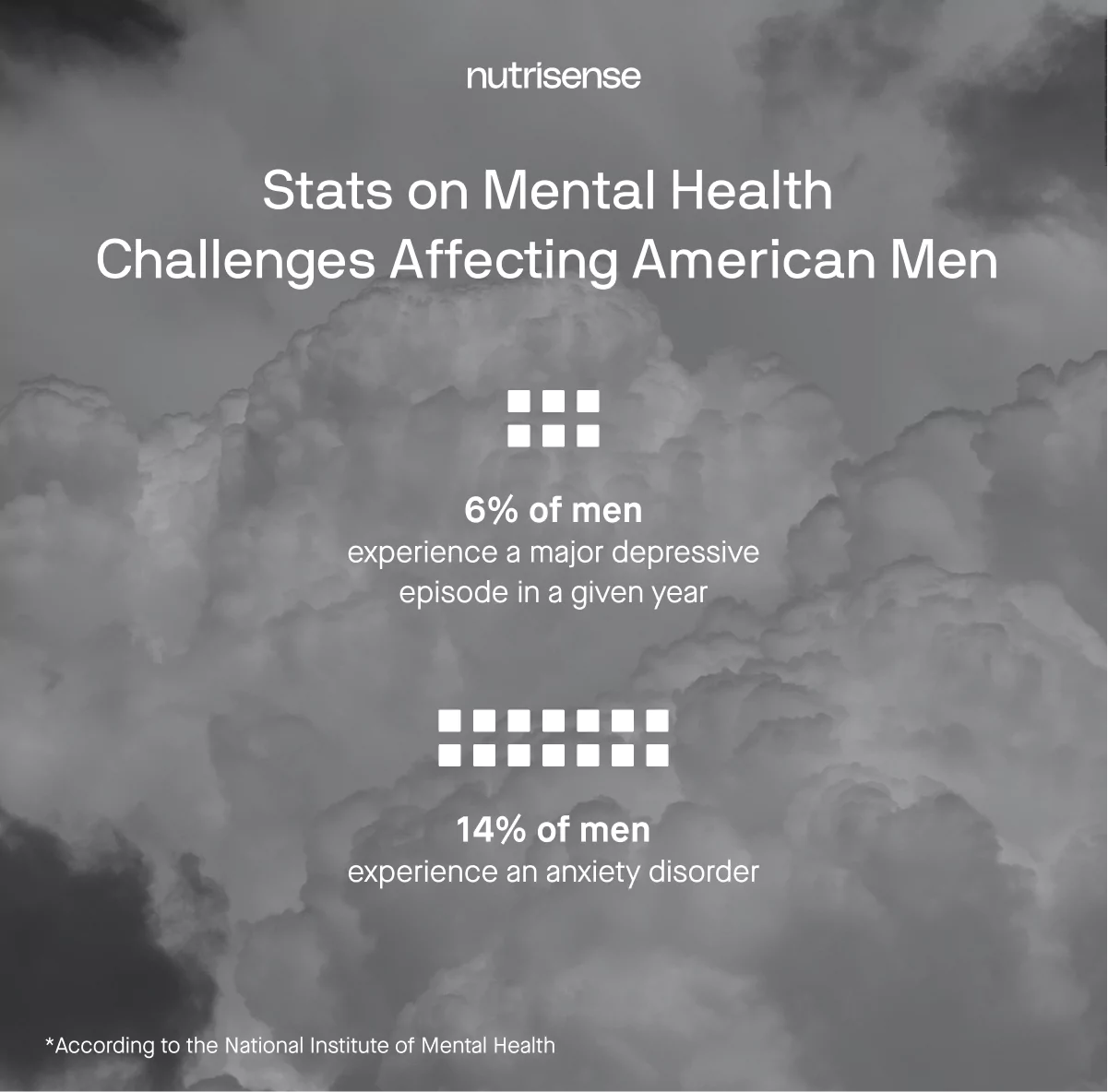
Mental health and behavioral stress management are essential components of overall well-being for men. Taking care of one's mental health is just as crucial as maintaining physical health.
Unfortunately, mental health concerns, including anxiety, depression, and other conditions, are prevalent among men, and often stigmatized. In fact, about six percent of men in the U.S. experience a major depressive episode in a given year, and approximately 14 percent of men experience an anxiety disorder.
Although mental illness is more prevalent among women, men are less likely to seek mental health treatment. Seeking professional help, such as therapy or counseling, can provide tools and strategies for managing stress, overcoming mental health challenges, and improving overall quality of life.
Recognizing the importance of mental health and stress management is crucial for men to address their mental well-being proactively. Don’t be afraid to seek support.
5) Find a Primary Care Doctor and See them Yearly
Preventive healthcare and regular visits to a healthcare provider or primary care doctor can allow for early detection, timely intervention, and effective management of potential health issues. Heart disease, as we’ve seen, is the leading cause of death for Americans.
Speaking with your doctor can help you understand your family history of any such health conditions so that you can implement positive lifestyle changes and be proactive about your health. Routine check-ups allow doctors to monitor blood pressure, assess cholesterol levels, and evaluate other risk factors that affect heart health.
Apart from heart disease, men also have a higher risk of developing colon cancer. Regular check-ups and cancer screenings enable doctors to discuss appropriate screening options, such as colonoscopies, to detect and prevent colorectal cancer or identify it in its early stages when treatment is most effective.
By visiting a primary care doctor yearly, you can identify potential risk factors and receive personalized recommendations for maintaining or improving their health. It's an opportunity to discuss concerns, ask questions, and receive guidance on healthy living.
6) Get Plenty of Sleep and Rest
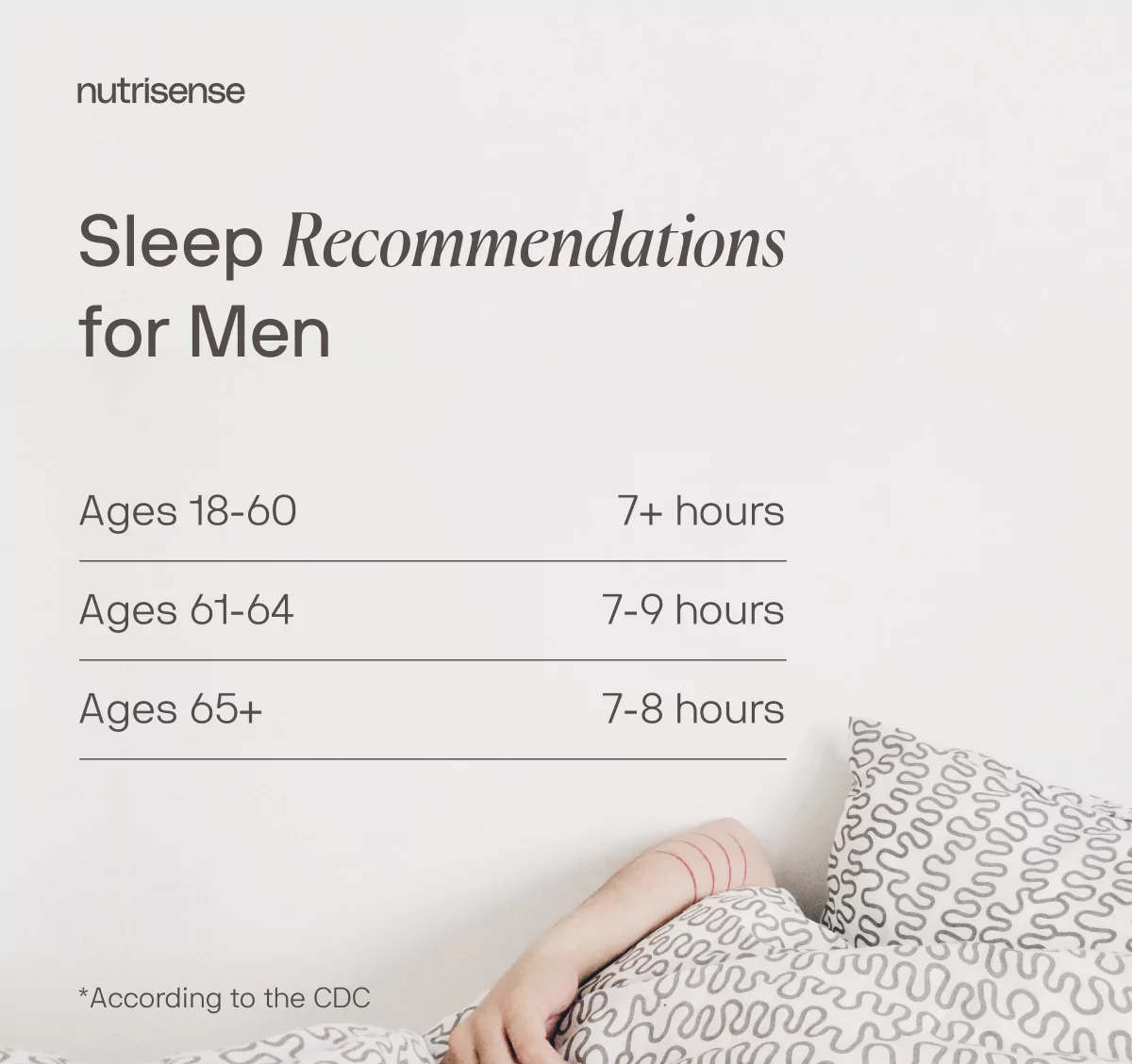
While it's true that men generally require slightly less sleep than women, it is still important for men to prioritize sufficient and quality sleep, as not getting enough sleep can have significant health effects.
According to the Centers for Disease Control and Prevention, men between the ages of 18 and 65 should aim for about seven to nine hours of sleep per night. Sleep is essential for everyone—it aids physical recovery, healing, and maintaining optimal body function.
Insufficient sleep can weaken the immune system, making men more susceptible to illnesses and infections. It can also contribute to weight gain and increase the risk of conditions such as obesity, diabetes, and cardiovascular disease.
Sleep also plays a critical role in supporting mental health and emotional well-being. Inadequate sleep can impair cognitive function, memory, and decision-making abilities. It also increases the risk of mental health disorders such as depression and anxiety.
7) Stay Connected With Family and Friends
Loneliness and social isolation are associated with higher rates of mental health conditions and chronic illnesses. Luckily, research shows that maintaining strong and supportive social connections can reduce levels of stress, anxiety, and depression and improve overall health.
Social relationships offer a valuable source of emotional support. Having trusted friends, family members, or partners with whom men can share their thoughts, feelings, and challenges can provide comfort, reassurance, and a sense of belonging. This emotional support can help reduce stress levels and enhance mental well-being.
8) Do Something You Enjoy Daily

Identifying activities and hobbies that bring joy and making time for them regularly is an important way to prioritize enjoyment as part of a healthy lifestyle. This involves consciously seeking and embracing activities, experiences, and relationships that bring fulfillment and a sense of purpose.
These activities can help to counterbalance the demands and stressors of everyday life. Plus, engaging in activities that bring joy and pleasure can promote overall mental, emotional, and physical health.
9) Try to Reduce Other Stressors in Your Daily Life
Stress has a significant impact on overall health, particularly when it comes to cardiovascular health and blood sugar regulation. Chronic emotional or psychosocial stress triggers a cascade of physiological responses in the body, including the release of stress hormones like cortisol and adrenaline.
Prolonged or frequent activation of these stress responses can lead to increased blood pressure, heart rate, and inflammation, all of which contribute to the development and progression of cardiovascular disease.
For men, chronic or excessive stress can increase the risk of cardiovascular disease and contribute to the development of prediabetes or exacerbate existing blood sugar issues. Chronic stress can also influence unhealthy behaviors like overeating or excessive alcohol consumption, further elevating cardiovascular risk.
Stress also affects blood sugar levels: over time, chronic stress can disrupt the regulation of insulin and glucose in the body, potentially leading to insulin resistance and an increased risk of developing prediabetes or type 2 diabetes. By addressing and managing all sources of stress, it may be possible to mitigate the impact on cardiovascular health and blood sugar regulation.
10) Limit Your Consumption of Alcohol
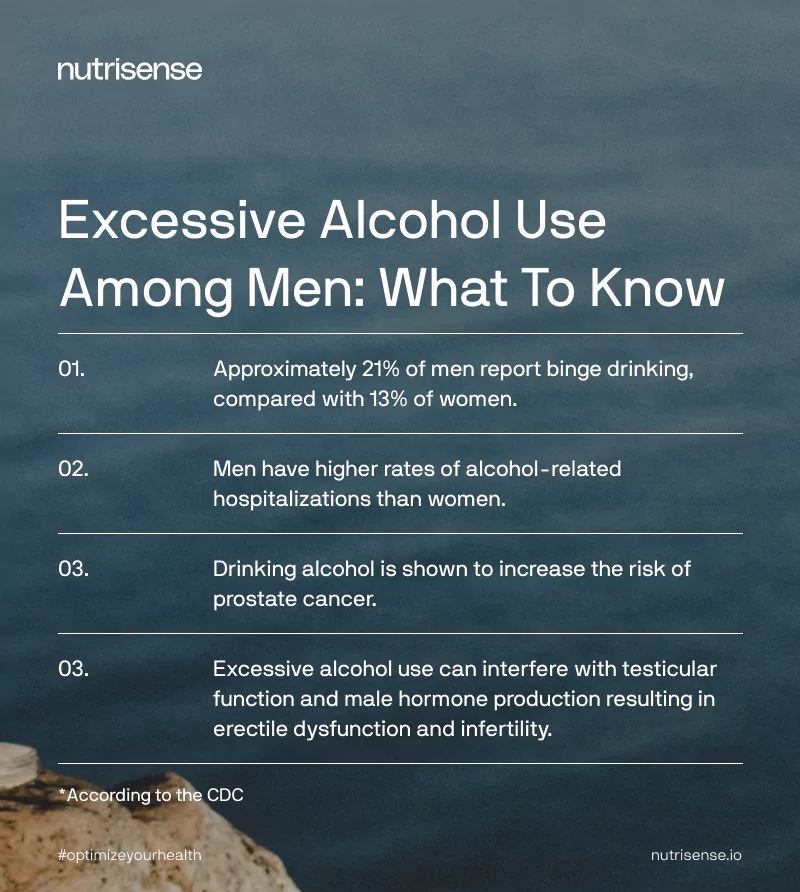
Alcohol consumption, particularly excessive or chronic drinking, can significantly increase the risk of various health conditions that disproportionately affect men. For example, studies show that men are twice as likely to die from alcohol-related liver disease than women.
Alcohol consumption is also associated with an increased risk of various types of cancer, including colorectal cancer, which we know disproportionately affects men. Men also face higher rates of alcohol-related deaths compared to women.
To promote healthier alcohol consumption habits and reduce associated risks, drinking in moderation and being aware of one’s personal limits can be helpful. Seeking professional help and resources to address the issue may also be beneficial for men wanting to reduce their consumption.
Find the right Nutrisense programto turn insight into progress.
Go Beyond Glucose Data with Nutrisense
Your glucose can significantly impact how your body feels and functions. That’s why stable levels are an important factor in supporting overall wellbeing. But viewing glucose isn't enough. Nutrisense, you’ll be able to learn how to use your body's data to make informed lifestyle choices that support healthy living.
One-to-one coaching
Sign up to access insurance-covered video calls to work with a glucose expert: a personal registered dietitian or certified nutritionist who will help tailor your lifestyle and diet to your goals.
Monitor and measure what matters
With the Nutrisense CGM Program, you can monitor your glucose with health tech like glucose biosensors and continuous glucose monitor (CGM)s, and analyze the trends over time with the Nutrisense App. This will help you make the most informed choices about the foods you consume and their impact on your health.
Find your best fit
Ready to take the first step? Start with our quiz to find the right Nutrisense program to help you take control.

Heather is a Registered and Licensed Dietitian Nutritionist (RDN, LDN), subject matter expert, and technical writer, with a master's degree in nutrition science from Bastyr University. She has a specialty in neuroendocrinology and has been working in the field of nutrition—including nutrition research, education, medical writing, and clinical integrative and functional nutrition—for over 15 years.


.webp)

